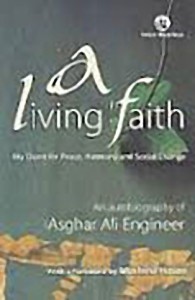Late Asghar Ali Engineer’s autobiography, released in 2012 reflects on what he sees as the purpose of his life”struggling to achieve social justice, promoting inter-communal harmony and building a new world.
A Living Faith”My Quest for Peace, Harmony and Social Change
Author: Asghar Ali Engineer
Publisher: Orient Black Swan, Hyderabad
Year: 2012
Pages: 345
Price: Rs. 395
Reviewed by Yoginder Sikand
Surely, I am convinced, the story of every single human being, no matter how insignificant he or she may be considered by others to be, is worth listening to. Everyone’s life is, at a fundamental level, really quite the same: being a quest for meaning and purpose and a series of experiences that oscillate between pain and pleasure. Learning about how others have sought to supply their life with meaning and have dealt with the pain and pleasure that have come their way can help in making one’s own life more meaningful”or, to put it differently, somewhat less meaningless. That is the principal worth, I would think, of reading an autobiography. Readers approaching scholar Asghar Ali Engineer’s autobiography with that intention are sure to find much of it inspiring.
Mumbai-based Engineer was well-known in social activist circles, in India and abroad, as someone who has spent years trying to promote inter-communal harmony. He is also thought of as somewhat of an original Islamic scholar, who sought to develop understandings of his religion in response to contemporary human rights sensibilities and to decry widespread human rights violations by those who claim to be Islam’s most ardent defenders. He was a prolific writer, and, even though he was well into his seventies, he continued to travel in India and abroad, seeking to promote better understanding and relations between his fellow Muslims and people of other faiths”which, almost everywhere, seem to be getting from bad to worse.
Engineer’s account of his early life is riveting”this is the portion of the book I enjoyed the most. He recounts, albeit only too briefly, his growing up in a lower-middle class family in a small town in Madhya Pradesh and being educated in government-run Urdu- and Hindi-medium schools. Life for the son of a mullah or priest belonging to the Bohra sect of Muslims wasn’t exactly easy. The community was deeply conservative. Although fairly prosperous, the Bohras, Engineer tells us, lived under slavery-like conditions, being ruled by the Syedna, the Bohra head-priest, who considered himself as their lord and master. It was the Syedna’s autocracy, Engineer reveals, that first triggered within him a deeply-felt horror of injustice. In his youth, Engineer was forced, against his will, to prostrate before the Syedna, and was sharply abused for his reluctance to do so. Deeply repelled by this incident, Engineer began to decry abuses of power by the Syedna and his family, gradually emerging as one of the leaders of what is called the ‘reformist Bohra movement’, while at the same time working in Mumbai as an engineer (which explains his surname).
Engineer’s account of the emergence of the Bohra reformist movement, which demanded internal democracy, an end to the dictatorship of the Syedna and the scrapping of a slew of laws and taxes the Syedna had imposed on the community”is deeply moving, highlighting the courage that drove this band of reformers, and the enormous opposition that they had to contend with. Most of the pioneer reformists, including Engineer himself, were excommunicated from the Bohra fold by the Syedna. They could have no social relations whatsoever with those Bohras, including their close relatives, who remained, often due to fear, faithful to the orthodoxy. For his role in galvanizing and spearheading the movement, Engineer had to pay a heavy price: several attempts on his life by his orthodox opponents.
Engineer had been a consistent supporter of inter-communal relations in India, and his memoirs devote several pages to his role in investigating various communal riots, critiquing communalism through his voluminous writings on the subject and organizing workshops to promote communal harmony. What emerges from his brief description of these activities is a person who is deeply concerned, at a very fundamental level, with the terror and hatred unleashed in the name of religion and who feels impelled to do something about it.
The bulk of Engineer’s autobiography”almost two-thirds of the book”is a chronicle of his travels in countries in the West, Asia and Africa that he has visited, being invited there to attend conferences on religion, particularly on Islam, radicalism and inter-faith relations (Curiously, the book doesn’t even mention, leave alone have a separate section on, Engineer’s extensive travels within India.) Here, we learn about efforts at the international level, in which Engineer had played a seminal role, to promote alternate, more humane understandings of religion, to counter terrorism in the name of Islam and to build bridges between people of different religious backgrounds. After devoting more than 200 pages describing his travels abroad to deliberate on issues, generally troublesome, pertaining to religion in the contemporary world, Engineer devotes less than ten pages to wind up his memoirs. In a section titled ‘Looking Back, Looking Ahead’ he reflects on what he sees as the purpose of his life”struggling to achieve social justice, promoting inter-communal harmony, building a new world, and so on. In this regard, he says, he is inspired by saintly figures in different religious traditions. This is all very laudable, no doubt, and the reader can’t be left unimpressed by Engineer’s many intellectual achievements and activities, which he recounts for the benefit of his readers.
Despite the book’s obvious limitations, it is, in parts, powerfully inspiring, revealing a man who has spent several decades pursuing a cause that he deeply believed in.


COMMENTS